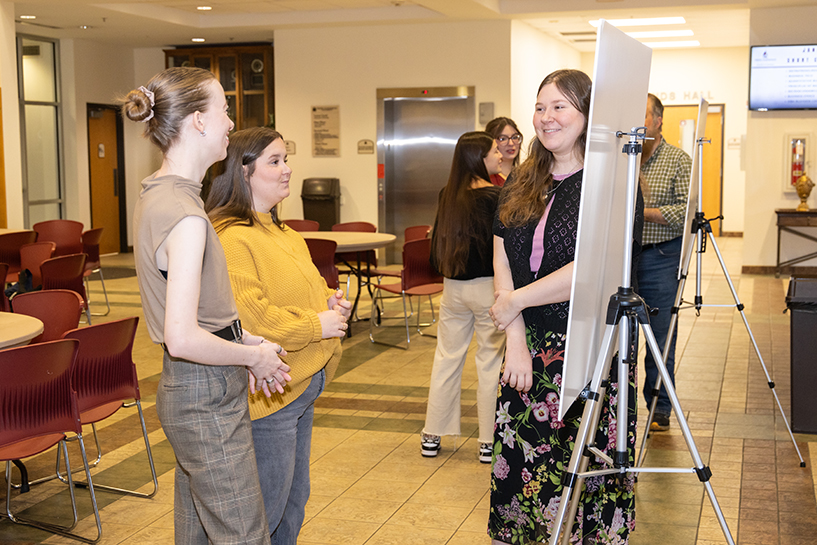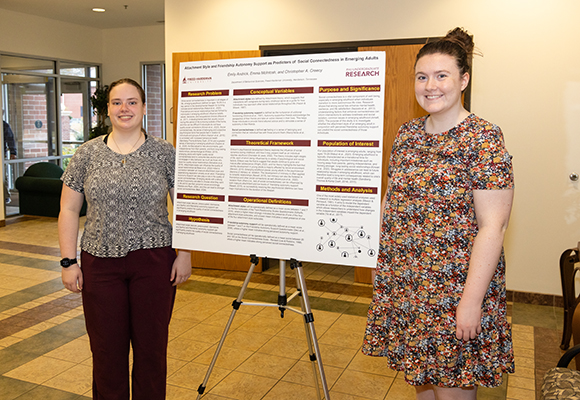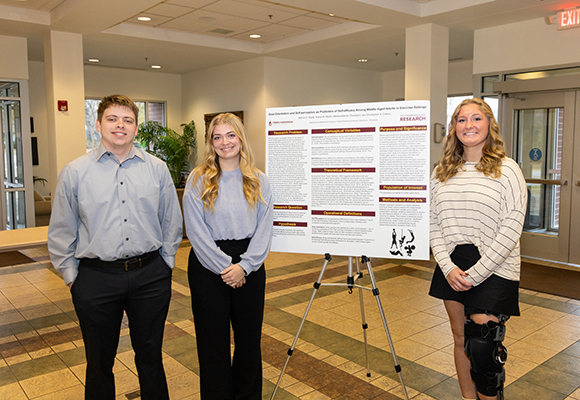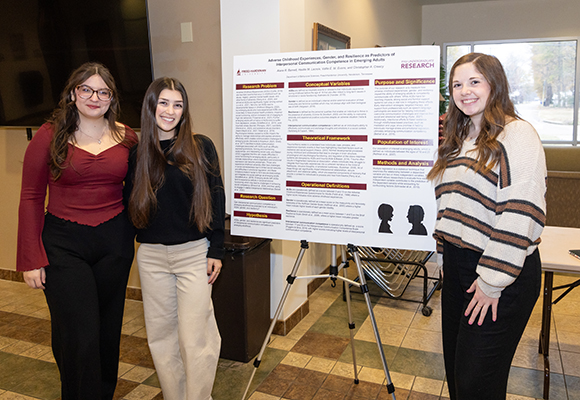
December 2024
FHU Psychology Students Share Research Presentations
At the conclusion of a busy fall semester, psychology students in Dr. Chris Creecy’s Research Methods II class gathered in the lobby of Brown-Kopel Business Center to present the findings from their ongoing research projects. Displaying posters that highlighted key factors in their research, groups conversed with teachers, fellow students and visitors who were interested in learning more about their unique findings.
Emily Andrick and Emma McIntosh presented on the topic of “Attachment Style and Friendship Autonomy Support as Predictors of Social Connectedness in Emerging Adults.” Andrick, who hopes to own her own counseling practice one day, stated what led the pair to this particular topic.

(l to r) Emily Andrick and Emma McIntosh
“We were first looking at four different attachment styles that are typically formed as children from their parents,” she explained. “Then we took the concept of autonomy, which is independence and the ability to make your own choices, and added friendship. Basically it means that your friends support your autonomy and they allow you to make your own choices. We want to see if those things have an impact on the quality of social relationships in emerging adults [typically ages 18-25].”
The “emerging adult” population was also the focus of students Maggie M. Painter and Hannah E. Sherwin, whose project was titled “Gender, Attachment Style, and Coping Style as Predictors of Vulnerability to Grief Responses in Emerging Adults.” While it may seem unusual to associate significant loss with those within the 18-25 age group, Painter shared that, in actuality, about 40% of that population has dealt with the loss of someone very close to them.
In fact, both research partners had faced their own issues of grief, either in seeing close friends and family deal with loss or in facing very personal loss themselves. “I find the vulnerability aspect of this research interesting because that word usually has a stigma to it,” Painter said. “People being vulnerable is often seen as a weakness, but this is what makes us human. So, highlighting that vulnerability is important to have, especially during grief, is something that I found very interesting.”

(l to r) Bryson Wyatt, Ariana Martin and Marliemekenna Thompson
Students Bryson S. Wyatt, Ariana M. Martin and Marliemekenna Thompson presented “Goal Orientation and Self-perception as Predictors of Self-efficacy Among Middle-aged Adults in Exercise Settings.” This research examined how much self-perception (aging, body image, athletic abilities and self-esteem) influences the way that middle-aged adults choose to participate in exercise regimens.
According to Martin, “Middle-aged adults have a lot of life responsibilities to juggle which may prevent them from choosing to exercise. We are also interested in how their own self-concept plays in with that decision.”
Another project addressed the topic of “Predicting Fear of Failure in Emerging Adults Using Resilience, Self-esteem, Perfectionism, and Self-efficacy,” by Tara L. Griffith and Caroline E. Ramey. Investigating a slightly wider age range of 18-29, the students wanted to see how the noted predictors play into a person’s fear of failure and how individuals approach failure tasks in their own lives.
“Emerging adulthood is all about new opportunities,” said Griffith, who hopes to continue her studies in graduate school and pursue research in the field of psychology. “So we wanted to know if fear of failure is preventing some opportunities more than others. And how does it affect different individuals based on their levels of beliefs?”

(l to r) Alane Barnett, Heidie Lacroix and Vallie Evans
The final group consisted of Alane R. Barnett, Heidie M. Lacroix and Vallie E. M. Evans, who presented their research on “Adverse Childhood Experiences, Gender, and Resilience as Predictors of Interpersonal Communication Competence in Emerging Adults.” The students’ goal was to see how all three of these variables worked together to affect a person’s ability to competently communicate with another individual on an interpersonal level.
“Adverse childhood experiences (or ACEs) include traumatic events that occur for a child before the age of 18 and may affect him or her long term,” Lacroix explained to listeners. “Individuals will have an ACE score that is arranged from 0-10 based on how many of those traumatic events they have experienced in childhood, and this may act as a predictor of future interpersonal communication competence.”
Each of the five research groups stated that they have worked well together, delegating jobs, offering feedback and learning from one another as well as from the scholarly literature. These psychology majors have been investigating their chosen topics for two semesters, and they will continue with final data collection throughout the spring.